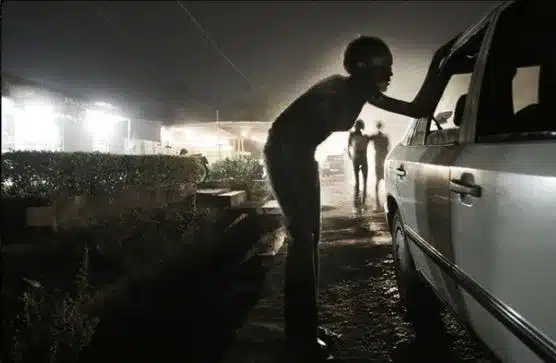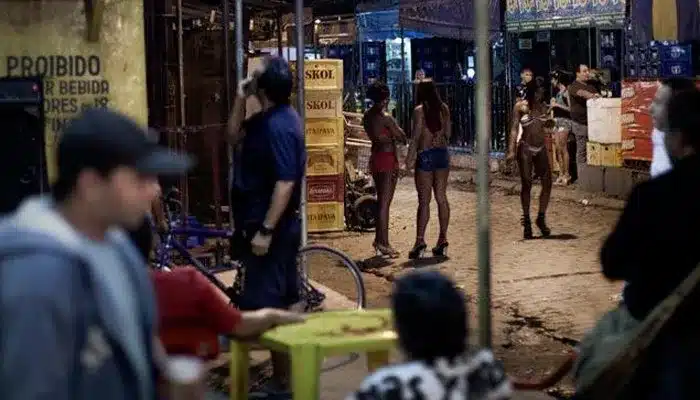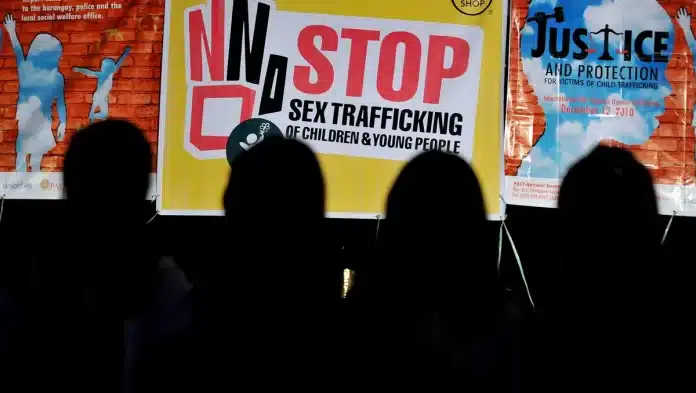s3x trafficking and prostitution is a pervasive and disturbing issue that plagues societies around the world, and Nigeria is no exception. With a high rate of poverty and unemployment, coupled with weak law enforcement, Nigeria has become a hotbed for the s3x trafficking industry.
In fact, the country is considered a source, transit, and destination country for women and children who are trafficked for s3xual exploitation. The situation is dire, with victims facing physical, emotional, and psychological abuse at the hands of their traffickers.
Despite efforts to curb the problem, s3x trafficking remains a significant challenge in Nigeria, and urgent action is needed to put an end to this modern-day form of slavery.

Definition of s3x trafficking
What is s3x trafficking? How common is s3x trafficking in Africa? Well, for starters, s3x trafficking, also known as human trafficking for s3xual exploitation, refers to the recruitment, transportation, transfer, harbouring or receipt of persons through the use of force, coercion, fraud, or deception, for the purpose of exploitation for commercial s3x acts.
s3x trafficking can occur within a country or across borders, and victims are often forced to work in brothels, strip clubs, or other commercial s3x establishments. The victims of s3x trafficking are typically women and girls, but they can also include men and boys.
They may be lured with false promises of employment or education or maybe abducted or sold by family members or acquaintances.
s3x trafficking is considered a serious human rights violation and a form of modern-day slavery. It is illegal in most countries, and efforts are made by international organizations, governments, and non-governmental organizations to combat this form of exploitation and protect the victims.
Overview of s3x trafficking in Nigeria
Nigeria is a source, transit, and destination country for s3x trafficking. According to the United States Department of State’s 2021 Trafficking in Persons Report, Nigeria is classified as a Tier 2 country, meaning that it does not meet the minimum standards for the elimination of trafficking but is making significant efforts to do so.
Women and children are the primary victims of s3x trafficking in Nigeria. Traffickers often lure their victims with false promises of employment or educational opportunities but then force them into prostitution. Some victims are also sold into s3x trafficking by family members or acquaintances or are abducted.
Traffickers in Nigeria often use voodoo rituals or “juju” to control their victims, creating a fear of retribution or harm to family members if they try to escape or speak out against the traffickers. Many victims are subjected to physical and s3xual violence and denied basic human rights and access to medical care.
In recent years, the Nigerian government has increased its efforts to combat s3x trafficking, including enacting legislation and implementing programs to provide support for victims.
However, there are still significant challenges, including corruption and limited resources, that hinder effective efforts to address this issue. Additionally, the COVID-19 pandemic has led to an increase in vulnerability to trafficking, particularly among women and children.

Causes of s3x trafficking in Nigeria
What is s3x trafficking? s3x trafficking, also known as human trafficking for s3xual exploitation, is a serious issue in Nigeria. The causes of s3x trafficking in Nigeria are complex and multifaceted and can be attributed to a range of economic, social, and political factors. Some of the major causes include:
- Poverty: Poverty is a major driver of s3x trafficking in Nigeria. Many families in poverty-stricken areas are vulnerable to trafficking because they lack economic opportunities and often resort to selling their children into slavery to make ends meet.
- Lack of education: Lack of education is another contributing factor to s3x trafficking in Nigeria. Children who are not educated are more likely to be lured into trafficking schemes because they are unaware of the risks involved.
- Gender inequality: Gender inequality in Nigeria also plays a role in s3x trafficking. Women and girls are often viewed as second-class citizens and are, therefore, more susceptible to exploitation and abuse.
- Political instability: Nigeria’s history of political instability has contributed to the rise of s3x trafficking. The country has experienced several years of civil war, military coups, and ethnic tensions, which have created an environment of lawlessness and insecurity that makes it easier for traffickers to operate.
- Cultural factors: Certain cultural practices in Nigeria, such as early marriage and female genital mutilation, also contribute to the vulnerability of girls and women to s3x trafficking.
- Corruption: Corruption is another major cause of s3x trafficking in Nigeria. Officials who are supposed to enforce laws and protect citizens may be easily bribed or otherwise complicit in trafficking activities, allowing traffickers to operate with impunity.
SEE: Jungle Justice In Nigeria: When The Mob Rules
Forms of Exploitation in s3x Trafficking in Nigeria
By focusing on the different forms of exploitation that occur in the context of s3x trafficking in Nigeria, we can better understand the complex nature of the issue and work towards developing effective strategies to address it.
These three concepts are all forms of exploitation that are commonly associated with s3x trafficking, and they can have serious physical, emotional, and psychological consequences for victims.
Let’s explore the forms below:
1. Forced Labour
Forced labour is a type of exploitation that is commonly associated with s3x trafficking in Nigeria. It involves the use of physical or psychological coercion to compel individuals to work against their will.
In the context of s3x trafficking, forced labour may involve victims being forced to provide s3xual services to clients or being forced to work in brothels, massage parlours, or other establishments that cater to the s3x trade.
Victims may be threatened, beaten, or otherwise coerced into performing s3x work, and may be subject to long hours, poor living conditions, and inadequate or non-existent pay.
2. s3xual exploitation
s3xual exploitation is a form of abuse that involves the use of power, coercion, or manipulation to force individuals into engaging in s3xual activities.
In the context of s3x trafficking in Nigeria, s3xual exploitation involves the use of force, fraud, or coercion to recruit and control victims who are then used for commercial s3x acts. Victims may be subjected to physical and emotional abuse, rape, and other forms of violence and may be forced to perform s3xual acts against their will.
3. Child s3x trafficking
Child s3x trafficking is a particularly heinous form of s3x trafficking that involves the exploitation of children for commercial s3xual purposes.
In Nigeria, child s3x trafficking is a significant problem, with children as young as six years old being sold into the s3x trade.
Victims of child s3x trafficking may be forced to perform s3xual acts, provide services in brothels or massage parlours, or engage in other forms of commercial s3x work.
Children who are trafficked for s3xual purposes are particularly vulnerable to physical and emotional abuse and may suffer from a range of long-term physical and psychological consequences as a result of their experiences.
It is important to note that child s3x trafficking is a form of child abuse and is illegal under both national and international law.

Profile of victims
s3x trafficking is a pervasive and widespread problem in Nigeria, affecting both adults and children. The victims of s3x trafficking in Nigeria come from different socio-economic backgrounds and have varying levels of education.
However, some common factors are present in many victims’ experiences. These factors include poverty, lack of education, unemployment, migration, and discrimination.
READ: Domestic Violence: 5 Signs you are a victim and helpful resources
Children
One of the most vulnerable groups to s3x trafficking in Nigeria is children. These children are often from poor families or rural areas and are lured by traffickers with promises of education or employment.
Some examples of child victims of s3x trafficking in Nigeria include:
Aisha (not her real name), a 14-year-old girl from a poor family in the northern part of Nigeria, was promised a job in Lagos but ended up being forced into prostitution.
Esther (not her real name), a 10-year-old girl from a rural village in Nigeria, was kidnapped and sold to a brothel in Lagos.
SEE: Mental Illness: Causes and Perception in Nigeria
Women
Women are also a significant group of victims of s3x trafficking in Nigeria.
These women are often from low-income families and are vulnerable to trafficking due to poverty and lack of education. Some examples of women who have been trafficked for s3x in Nigeria include:
Blessing (not her real name) is a 25-year-old woman who was promised a job in Italy but ended up being forced into prostitution in Nigeria.
Gloria (not her real name), a 19-year-old woman from a rural village in Nigeria, was trafficked to Libya and forced into prostitution.
Men
While women and children are the most common victims of s3x trafficking in Nigeria, men are also at risk. Men are often trafficked for forced labour, but some are also trafficked for s3x. Some examples of men who have been trafficked for s3x in Nigeria include:
Ahmed (not his real name) is a 27-year-old man who was promised a job in Dubai but was trafficked to Nigeria and forced into prostitution.
Tony (not his real name) is a 21-year-old man who was kidnapped and forced into prostitution in Nigeria.
The victims of s3x trafficking in Nigeria come from different backgrounds and are vulnerable to trafficking due to poverty, lack of education, unemployment, migration, and discrimination.
Children, women, and men are all at risk, and traffickers use various tactics to lure their victims, including false job promises, kidnapping, and physical coercion.
READ: Yahoo Yahoo In Nigeria
Traffickers in Nigeria
s3x trafficking is a significant problem in Nigeria, with many women and girls being forced into the s3x trade either within the country or internationally. The issue is fueled by a combination of poverty, inequality, and a lack of economic opportunities, which make women and girls vulnerable to exploitation and abuse.
Many s3x traffickers in Nigeria operate in a network of criminal organizations that span the country and beyond. They use various means to recruit and transport victims, including deception, coercion, and kidnapping.
Once the victims are in their custody, the traffickers subject them to physical and s3xual abuse, forcing them to work in brothels, hotels, or on the streets as prostitutes. Some victims are also sold to clients for s3xual exploitation.
The Nigerian government has taken some measures to address the issue of s3x trafficking, including the enactment of laws and policies aimed at combating the crime.
However, corruption, weak law enforcement, and lack of resources have made it difficult to effectively enforce these measures.
Non-governmental organizations (NGOs) and international organizations also play a significant role in the fight against s3x trafficking in Nigeria. They work to provide support to victims, raise awareness about the issue, and advocate for policies that protect women and girls from exploitation.
It is important to note that not all s3x work is the result of trafficking, and many s3x workers in Nigeria are engaging in consensual transactions. However, the prevalence of s3x trafficking in the country means that it is crucial to address the issue and provide support to its victims.
READ: Vanity Plates in Nigeria: For the Big Boys Alone
Consequences of s3x trafficking
Here are some of the main consequences of s3x trafficking in Nigeria:
- Physical and psychological harm: Victims of s3x trafficking are often subjected to physical and s3xual abuse, as well as psychological trauma. They may suffer from injuries, s3xually transmitted infections, unwanted pregnancies, and mental health issues such as depression, anxiety, and post-traumatic stress disorder.
- Loss of freedom and autonomy: s3x trafficking victims are often held captive and forced to work in the s3x industry against their will. This can result in a loss of freedom and autonomy, as well as a lack of control over their own lives.
- Economic exploitation: s3x trafficking victims are often forced to work without pay or for very low wages. They may also be forced to pay off debts to their traffickers, which can result in a cycle of economic exploitation.
- Stigmatization and social ostracism: s3x trafficking victims may face social stigma and ostracism from their communities, as well as discrimination and rejection from family members and friends.
- Health risks: s3x trafficking victims are often exposed to health risks such as HIV/AIDS, as well as other s3xually transmitted infections and diseases.
- Legal consequences: s3x trafficking is illegal in Nigeria, and victims may face legal consequences if they are caught working in the s3x industry. This can result in fines, imprisonment, and deportation.
s3x trafficking has devastating consequences for its victims, and it is a serious human rights issue that needs to be addressed.
SEE: Cancel Culture: An Organized Kind of Chaos
Government and NGO responses to s3x trafficking in Nigeria
s3x trafficking is a serious issue in Nigeria, and both the government and NGOs have taken various measures to address this problem. Here are some of the responses:
Government Responses:
- Legislation: The Nigerian government has passed several laws to combat s3x trafficking, including the Trafficking in Persons (Prohibition) Enforcement and Administration Act in 2003 and the Violence Against Persons Prohibition Act in 2015.
- Law enforcement: The government has established anti-trafficking task forces and units within law enforcement agencies to investigate and prosecute traffickers.
- Prevention programs: The government has launched several prevention programs aimed at educating people about the dangers of trafficking, especially women and children.
- Victim protection: The government has also established shelters and rehabilitation centres to provide support and protection for victims of trafficking.
NGO Responses:
- Awareness campaigns: Several NGOs in Nigeria have launched awareness campaigns to educate people about the dangers of trafficking, especially women and children.
- Victim support: NGOs provide support services to victims of trafficking, including medical care, counselling, and legal assistance.
- Advocacy: NGOs engage in advocacy efforts to raise awareness about the issue of trafficking and to encourage the government to take more action.
- Capacity building: NGOs work to build the capacity of law enforcement agencies, government officials, and other stakeholders to combat trafficking effectively.
- Economic empowerment: Some NGOs work to provide economic empowerment opportunities for women and girls to reduce their vulnerability to trafficking.
The Nigerian government and NGOs have made efforts to address s3x trafficking, but much more work needs to be done to effectively combat this issue.
SEE: Childhood Insults That Hurt Worse Than Koboko
Conclusion
s3x trafficking is a serious issue in Nigeria, with women and children being the primary victims. Poverty, lack of education, gender inequality, political instability, cultural factors, and corruption are some of the major causes of s3x trafficking in the country.
Efforts to combat the problem have been made by the Nigerian government and international organizations, but there is still a long way to go.
Urgent action is needed to protect the victims and prevent the spread of this modern-day form of slavery. It is crucial that we continue to raise awareness and work towards developing effective strategies to end s3x trafficking in Nigeria and around the world.





